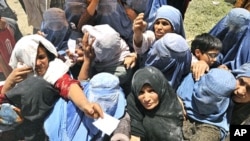Just weeks before United States President Barack Obama announced plans to draw down U.S. troops in Afghanistan, the Senate Foreign Relations Committee issued a report saying the close to $19 billion in U.S. aid to Afghanistan has been met with success, but the money could have unintended negative consequences. One Los Angeles based aid organization says it is operating in a way that avoids some of the negative results of helping Afghan people.
Money raised for humanitarian aid
Software and Internet entrepreneur Jim Hake is helping the U.S. military in Afghanistan by buying notebooks, pencils and many other things. "Soldiers and Marines tell us what they need to help the local people. They tell us about sewing machines that are needed for Afghan women, school supplies for local children, tools for men,” stated Hake.
Hake founded Spirit of America, a Los Angeles-based organization that receives private donations through the Internet and uses all of that money to buy supplies for the Afghans. The organization buys most of the needed items in Afghanistan to help the local economy. Hake says the goal is to help the U.S. military built strong relationships with the local people in Afghanistan.
“We can all think of situations where we met someone who helped us. You have a very different impression of that person once you have that personal connection that personal interaction,” he said.
“The aid projects are very well intended. But unfortunately many of them also had unintended consequences,” Andrew Wilder stated. Wilder, of the U.S. Institute of Peace has been studying the effects of aid in Afghanistan. “We found that a lot of development assistance can be effective in achieving development objectives but it’s not effective at achieving the stabilization and security objectives,” he said.
Aid risks, unintended consequences
A recent report by the U.S. Senate Foreign Relations Committee, found that stabilization projects may have short-term results, such as developing relationships with the community and providing useful intelligence, but too much aid can destabilize the local economies and even create a recession as the U.S. decreases its presence there.
“We’ve created a war and aid bubble economy and now as we’re transitioning out, there’s a real risk that that’s going to pop,” noted Wilder.
The World Bank estimates 97 percent of Afghanistan’s gross domestic product comes from spending related to the presence of the international military and of aid organizations working to help the local population.
Lack of checks and balances
The money from most international donors, including the U.S. does not go through the Afghan government. The report warns that it weakens the government’s ability to control resources and can fuel corruption. The report says another side effect is that there are thousands of individual projects in Afghanistan with no plans for being sustainable.
But Jim Hake says not every project needs to be long term.
“Sustainability is an important concept but it can sometimes be misapplied. Misapplied in that sustainability is not always important. Initial stability - it’s a process to get a country like Afghanistan, or even a village, to the point where it is self sustaining and peaceful,“ he said.
Hake says once stability is achieved, Afghan security forces can take over and the aid project is no longer necessary.
As to corruption, Hake says his organization works on smaller scale projects so he knows exactly where the money goes.
“We don’t have layers of subcontractors when we source goods in Afghanistan we’re doing it directly with our personnel and the source of those goods,” he explained.
But challenges remain for the foreign aid currently flowing into Afghanistan.
Andrew Wilder advocates a slow decrease of funding over time to avoid a sudden drop in aid. He says the money that goes to Afghanistan should be channeled through the Afghan government to give it more control over its resources.
"It is important for donors to support these national programs, and have checks and balances and mechanisms to ensure accountability. But they have much better likelihood of surviving longer term and being sustained than programs that were conceived outside of government budget,“ he said.
The recent U.S. Senate report says it is important to have continued oversight of aid to the Afghan government and funding should continue only if the government makes progress in fighting corruption and stabilizing its financial system.




